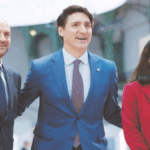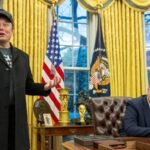President Trump’s executive order designating Mexican cartels and other criminal organizations as foreign terrorists could force some U.S. companies to stop doing business in Mexico instead, according to former administration officials and analysts. that the risk of US sanctions should be taken. Given their deep economic interdependence.
The executive order, which Mr. Trump signed on Monday, aims to put more pressure on Mexico to rein in the dangerous drug trade. This designation, in general, gives his administration greater authority to impose economic sanctions and travel restrictions, and possibly even to take military action in foreign countries.
Still, disentangling cartel operations from U.S. interests in Mexico can be extremely complicated. Mexico is the largest trading partner of the United States, and many American companies have manufacturing operations there.
Even more complex, these criminal networks have expanded their operations far beyond drug trafficking and human trafficking. They are now widely embedded in the legal economy, from avocado farming to the country’s multibillion-dollar tourism industry, making it difficult to ensure that American companies are insulated from cartel activity.
“It’s come up in the political arena from previous administrations and members of Congress wanting to do it,” said Samantha Sultan, a senior adviser on sanctions policy and risk finance in the Trump and Biden administrations.
“But no one did because they saw what the impact would be on trade, economic and financial relations between Mexico and the United States.” “They’ve all come away thinking that such a position would actually be very short-sighted and ill-conceived, even though the previous administration viewed the US-Mexico relationship very differently than the incoming Trump administration.”
Foreign terrorist designation can lead to heavy penalties – including hefty fines, asset forfeiture and criminal charges – for companies and individuals found to have paid ransom or extortion. U.S. companies can also be trapped by standard payments made to Mexican companies that a cartel controls without the U.S. companies’ knowledge.
Some extortion payments, even if made under duress, can be considered “material support” for cartels, said Pablo Zarate, senior managing director at FTI Consulting, a US firm that has Report To describe some of the dangers of terrorist designation.
Former U.S. officials and analysts pointed out that given the tens of thousands of people involved and employed in various industries, including the hotel and agriculture sectors, it would be nearly impossible to identify which businesses might employ cartel members or not. May be associated with this. Cartels use the legal economy to launder money, which can mean unwitting employees working at a resort or an avocado packing company may technically be on the cartel payroll but not know it.
As a result, companies in the risk-averse U.S. financial sector may refuse to lend money to a Mexican factory, for example, to facilitate cross-border production and trade, or to move money between personal accounts. For delivery.
“Banks can hold off on customers because they don’t think they’re worth the risk if they have ties to Mexico,” said Eric Jacobstein, a former State Department official in the Biden administration.
Fabian Teichmann, a Swiss lawyer and terrorist financing expert, said banks may ultimately decide to avoid all sectors deemed high risk. Mr. Teichmann mentioned Mexico’s avocado trade, where cartels have greatly expanded their operations, as an area that could come under greater scrutiny.
“Banks can say, ‘We don’t want to be around people who are considered terrorists, so we want to avoid that risk,'” Mr. Teichman said. “From a banking perspective, it would be a very sensible decision.”
Other types of financial institutions that facilitate payments between the United States and Mexico could also be affected, such as Venmo or PayPal, which Elon Musk, a close associate of Mr. Trump, helped found.
Mr. Teichmann said the terrorism label could push large parts of Mexico’s economy further into the shadows, where cash is used instead of electronically traceable transactions, making the cartels’ finances more difficult for investigators. It becomes difficult to evaluate the structure.
“If people can’t bank legitimately, they run to the so-called underground banking system,” Mr Teichman said.
In 2024, the US Chamber of Commerce surveyed 218 companies and found that 12 percent of respondents said “organized crime has gained partial control over the sale, distribution and/or pricing of their goods.”
The multinational banana company was Chiquita Brands. 2024 was found liable. for killings by a Colombian right-wing paramilitary group designated as a terrorist organization. Chiquita Brands said it had been extorted by a paramilitary group and forced to pay to protect Colombian employees. The plaintiffs, however, argued that the company had paid the paramilitary group to lure residents out to buy land at lower prices.
A terrorist designation would also hurt American companies that are located just north of the border but rely on Mexican labor. The designation is so broad and vague that farms in Texas or farms in California could be subject to fines if their employees send remittances to family members in Mexico who are involved in organized crime.
If money transfer companies like Western Union also stop transactions from Mexico over concerns about proper vetting of Mexican clients, it could affect the country’s remittances. This would be disastrous for the Mexican economy, received. $63.3 billion in remittances in 2023About 5 percent of the country’s gross domestic product.
The foreign terrorist designation could also pave the way for the United States to deploy troops against criminal organizations inside Mexico without the consent of the Mexican government, as it has done in Afghanistan and Syria.
But Afghanistan was occupied by the United States, and the Syrian government has lost control of much of its territory in recent years. It gave Washington some cover under international law for the US military to deploy troops and launch special forces operations to kill or capture terrorist leaders in those countries.
However, Mexico has cooperated with the United States for more than 30 years to combat cartels. Mexico may threaten to withhold cooperation if the United States is seen to be violating Mexico’s sovereignty. When the U.S. federal prosecutor’s office arrested Mexico’s former defense minister during Mr. Trump’s first administration, the Mexican government suspended all cooperation with the U.S. Drug Enforcement Administration.
“Unilateral action would be catastrophic,” said Craig Dear, a former US military attaché at the US embassy in Mexico in the 1990s.
“It would undo decades of Republican and Democratic cooperation and efforts to build a defense relationship with Mexico,” he said, adding, “If you don’t like cooperation now. , so wait until Mexico cuts all ties.”
On Tuesday, Mexican President Claudia Sheinbaum issued a stern warning to Mr. Trump during her daily news conference. “We will always defend our sovereignty,” Ms. Scheinbaum said. “We all want to fight the drug cartels, obviously. So what should we do? We have to coordinate efforts. We have to cooperate,” he said.
“Let them know that the President of the Republic will always defend Mexico,” the Mexican president added.












































